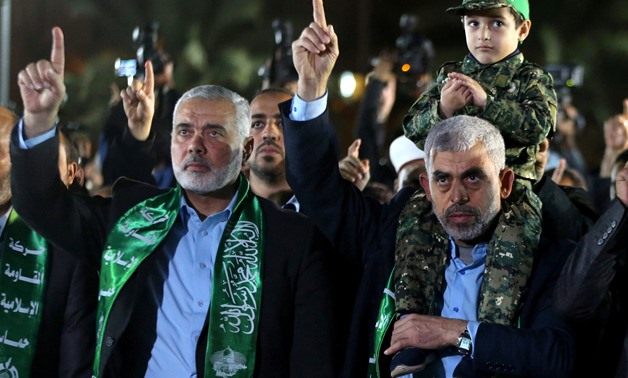
Hamas Gaza Chief Yahya Al-Sinwar (R), Hamas leader Ismail Haniyeh (L) during a memorial service for Fuqaha, in Gaza City March 27, 2017. REUTERS/Mohammed Salem/File Photo
CAIRO – 11 October 2017: Palestinian Hamas and Fatah factions resumed holding the second session of their national dialogue in Cairo on Wednesday, to complete the reconciliation process. The sessions were held under the auspices of the Egyptian government to realize the long-awaited Palestinian national unity.
Below is everything you need to know on the history of the division and Egypt’s initiatives to bridge the gap between the two parties.
Q -When did the split between the two main Palestinian political parties Fatah and Hamas happen?
In 2007, a conflict happened between Hamas and Fatah when Hamas’ control over the Gaza Strip freezed works of the Palestinian government of Ismail Haniyeh as well as the Parliament. Hundreds of people among the Fatah movement died and were wounded.
Q-Which countries fueled the split in recent years?
Turkey and Qatar supported the Hamas movement in order to deepen the split that serves Israeli plans, targeting to separate the West Bank from Gaza Strip politically and geographically.
Q- When did Egypt start its mediator role to bridg the gap between the two movments?
Egypt started its initiative in 2007 when it hosted leaders of Fatah and Hamas, aiming to encourage Palestinian parties to end the division and achieve partnership and national unity.
Q- Did Egyptian efforts exerted to end division succeed in realizing reconciliation?
Egypt succeeded in achieving national reconciliation between the two parties and the 2011 Fatah and Hamas agreement was signed in Cairo.
Q-When was the Government of National Accord (GNA) formed between Fatah and Hamas? Who chaired it?
GNA was formed between the two movments in June 15, 2014 and Rami Hamdallah was the Prime Minister.
Q-Why did the GNA withdraw from Gaza in 2015?
The cabinet members left Gaza in April 15, 2015 suddenly because of disagreements that happened with Hamas, which refrained from paying salaries for cabinet employees.
Q- Why did Hamas form the administrative committee in Gaza?
In March, Hamas resorted to form an administrative committee to do the works of the GNA of Hamdallah, who had left Gaza suddenly. Hamas emphasized that the administrative committee worked to tie between Gaza and the West Bank administratively, financially and politically.
Q- When did Hamas dissolve its administrative committee in Gaza? Why?
Hamas dissolved it in September 15, 2017 upon a request from Egypt in order to end the division and achieve national reconciliation with Fatah.
Q- When did the GNA visit Gaza? Why?
GNA chaired by Hamdallah visited Gaza to resume its work there upon a request from Egypt.
Q- When did the Palestinian dialogue sessions launch between Fatah and Hamas in Cairo? What is the point behind it?
The sessions launched on Tuesday to discuss ending the division between the two parties and finalize the national reconciliation.
The sessions aim to activate the 2011 Fatah-Hamas Cairo agreement, find a way to solve the cabinet employee salaries problem and to form a national government that includes all Palestinian factions.
Q- What is the next move after holding the Palestinian national dialogue between Fatah and Hamas?
During the sessions, participants agreed upon activating the 2011 Fatah-Hamas agreement. Cairo’s authorities will send invitations for other Palestinian factions to hold a comprehensive conference to discuss establishing a new national government.
Q-Why did Cairo start to discuss the reconciliation means, especially now? What is the point behind bridging the gap between Fatah and Hamas?
Egypt aims to wake and resume negotiation in the current period as it was marginalized after all interests were directed to conflicts waging in Syria, Libya and Iraq. Egypt aims to end rifts between the two movements to form a Palestinian unity before Israel at any negotiations.
Q- What are the basics that being discussed between Palestine and Israel?
The negotiation process is the basis of the Arab Peace initiative launched by the late Saudi King Abdullah in 2002. The initiative affirmed the tripartite coordination between Egypt, Jordan and Palestine as a basis and reference for any negotiation process with Israel.

Comments
Leave a Comment